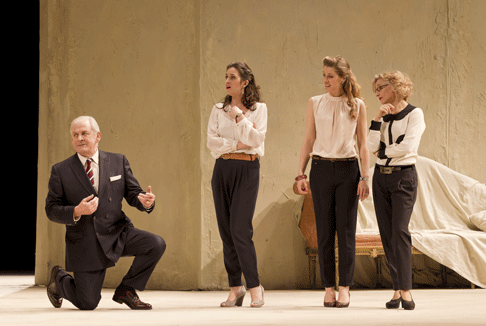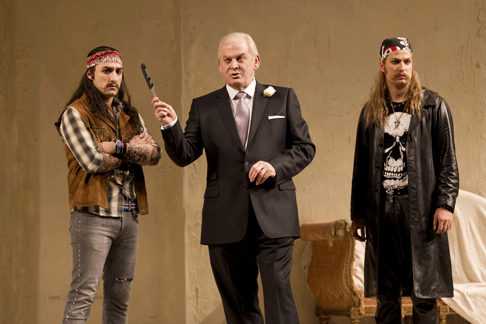Reviewing the February 2010 production, I remarked that Miller balances
comic artificiality with more serious purpose; and, indeed, in a short
programme note the director observes that “the awkward improbabilities of
the plot [long the cause of the opera’s neglect and denigration] can be
seen as a device that helps to make the opera more, rather than less,
serious”.
Despite this, there was much less gravity and momentousness on stage this
time around, with the visual gags out-weighing the underlying moral solemnity.
This was largely due to the self-indulgent, and thoroughly enjoyable, hamming
of the two male leads — as alternately all-conquering UN blue berets and
bandana-ed heavy metal aficionados; and to the comic artistry of Thomas
Allen’s Don Alfonso, a suave and knowing master-of-ceremonies. Allen
created this role in 1995, and having returned many times since he stepped
effortlessly into the Machiavellian schemer’s Armani suit and shoes.
The quartet of lovers was accomplished if not stellar, with the men shining
brightest. Returning to role of Ferrando, Charles Castronovo was in confident
and engaging form; his tenor may lack tonal variety, but it is a flexible,
pleasing voice, just right for the overly sentimental Ferrando. Lithe and
limber of both voice and physique — he even punctuated a phrase or two
with deftly executed press-ups! — Castronovo gave a consistent
performance: his cavatina, ‘Tradito, schernito dal perfido cor’,
was particularly affecting, the tender piano expertly controlled; and, in Act
2, ‘Ah, lo veggio’ attained even greater heights. His pairing with
Nicolay Borchev’s Guglielmo was dramatically and musically effective;
although Nicolay Borchev was perhaps overly robust and gruff at the opening, he
soon settled down and his open sound aptly conveyed Guglielmo’s naivety
and misplaced self-assurance.
The female pairing of Malin Bystrˆm, our indignant Fiordiligi, and MichËle
Losier, a stroppy Dorabella, were less well matched vocally. Bystrˆm’s
intonation was a little unsettled to begin, but once she got her vibrato under
full control, she demonstrated more bite and focus. Her soprano has a limited
palette and only one volume — fairly flinty and loud: this was apposite,
however, for her melodramatic rendering of ‘Come scoglio’, which
also showed off an impressively powerful lower register. Her phrasing might
have benefited from greater melodic grace, but this was a striking
representation of near-hysteria! Losier’s voice is more opulent, and at first
the girls’ sinuous interlocking thirds and sixths did not blend well.
Dorabella was dramatically rather slight and superficial in Act 1 but Losier
came into her own in Act 2; her duet with Guglielmo, ‘Il core vi
dono’ was sweet and rich, and ‘» amore un ladroncello’ was
full of character.
 Thomas Allen as Don Alfonso, MichËle Losier as Dorabella, Malin Bystrˆm as Fiordiligi and Rosemary Joshua as Despina
Thomas Allen as Don Alfonso, MichËle Losier as Dorabella, Malin Bystrˆm as Fiordiligi and Rosemary Joshua as Despina
More satisfying, and exciting, was Rosemary Joshua’s Despina: striding
forth in scarlet stilettos, she was not to be messed with. She patiently
dismissed the spoilt hysterics of her employers, dealt deftly with Don
Alfonso’s wandering hands, and relished the opportunity to don the
Doctor’s gown and lap up the limelight as the be-masked doctor clad in
green operating theatre garb, the cross-dressing role releasing Despina’s
own exuberant theatricality. Agile and energised, both of her arias were
expertly performed.
Allen himself was impeccable, his attention to musical and dramatic detail
remarkable, especially in the recitatives. Indeed, having — intentionally
or otherwise — taken an over-ambitious gulp of canapÈ, momentarily
delaying his vocal entry in the opening scene, he had the audience eating out
of his hand.
As Anne Ozorio put it, reviewing the September 2010 revival: “Sir
Thomas Allen’s presence guaranteed success. Like Don Alfonso, he’s
a grandee, elevated above the common run. The lovers strut and fret their hour
upon the stage, but Don Alfonso’s seen it all before.” Suave,
untroubled by events, assured of the outcome of his machinations, Allen’s
dramatic urbanity was complemented by a relaxed, confident musical rendition of
a role he must know backwards, upside down and inside out. His voice may not
have quite the commanding presence of yesteryear, but experience and consummate
ease goes a long to compensate for the odd ‘short cut’.
Allen’s combination of musical nuance and dramatic credibility — as
in the trio with Fiordiligi and Dorabella, ‘Soave sia il vento’,
where he cynically and convincingly shares in their sorrow — confirmed
him to be a true master of the theatre.
 Charles Castronovo as Ferrando, Thomas Allen as Don Alfonso and Nikolay Borchev as Guglielmo
Charles Castronovo as Ferrando, Thomas Allen as Don Alfonso and Nikolay Borchev as Guglielmo
This production has been a good investment for the ROH; recalled at least
every six months, perhaps the slightly distressed dÈcor (white walls, white
front drape, a sofa or two, a billow of cushions and an antique mirror
affording our fickle foursome a narcissistic opportunity or two) is suitably
cost-effective for this ‘age of austerity’. Modern and minimalist,
elegant and economical, it may be; but, the Starbucks and mobile ’phone
gags are wearing a little thin, and we’ve seen CNN cameramen rushing in
to record unfolding events a few too many times now for this motif to retain
its impact, or afford spontaneity to proceedings.
What was funny the first, or second, time around can, when repeated ad
infinitum, become irritating: the snap-happy sisters are wedded to their
camera phones, while Despina improvises a marriage contract on a laptop, and
mobile ’phone ring-tones mingle with arpeggiated continuo chords.
Admittedly, there has been some updating: Fiordiligi swiftly scrolls through
her smartphone to find the perfect mugshot of Guglielmo, swiping the screen in
perfect time to Mozart’s score.
But, there is a danger that such a plethora of visual gags will distract
from the drama and from the emotional profundity of the music itself. Moreover,
the staging lacks depth and variety of perspective: following the immediacies
and energy of the opening trio, presented before the wafting white drape, the
stage space beyond seems foreshortened and limiting. After all the busy
phone-zapping, hair-coiffuring and Prozac-popping of the recitatives, with each
aria or ensemble the principals invariably move to a stationary position at the
front of a stage or settle gracefully and motionless on a pile of pillows.
There is a surprising lack of direction in the substantial musical numbers,
especially given the attention bestowed on the visual paraphernalia; this is
particularly noticeable in the second act, where the drama becomes less
frenetic and the sentiments more sincere. The chorus barely gets a look in, too
often half-visible or practically ‘off-stage’.
Master Mozartian Colin Davis was in the pit, but while his reading has much
elegance, the tempi were too slow; this did allow the twisting, sensuous
woodwind melodies and timbres to shine, but the orchestra was repeatedly left
behind by the principals, and it took until the finale to Act 1 for proceedings
to reach a fittingly spirited romp.
Yet it mattered not, the evening was all about Allen, whose 40th year on the
ROH stage the performance explicitly celebrated. Bouquets and a gigantic
confection on wheels accompanied his curtain call. Allen threw several floral
tributes back into the audience, declaring “I love this place”. I
would not have been surprised to hear the answering cry, ‘We love you
too”.
Claire Seymour
image=http://www.operatoday.com/COSI-FAN-TUTTE-2012JP_00907.gif
image_description=Thomas Allen as Don Alfonso [Photo © ROH 2012 / Johan Persson]
product=yes
product_title=W. A. Mozart: CosÏ fan tutte
product_by=Ferrando: Charles Castronovo; Guglielmo: Nikolay Borchev; Don Alfonso: Thomas Allen; Fiordiligi: Malin Bystrˆm; Dorabella: MichËle Losier; Despina: Rosemary Joshua. Orchestra of the Royal Opera House. Royal Opera House Chorus. Conductor: Colin Davis. Original Director: Jonathan Miller. Revival Director: Harry Fehr. Set designs: Jonathan Miller with Tim Blazdell, Andrew Jameson, Colin Maxwell, Catherine Smith and Anthony Waterman. Lighting design: Jonathan Miller and John Charlton. Royal Opera House, Covent Garden, London, Friday, 27 January 2012.
product_id=Above: Thomas Allen as Don Alfonso
Photos © ROH 2012 / Johan Persson